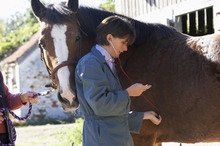The National Science Foundation has awarded a three-year grant of $999,950 to equine veterinarian, Dr. David Nash, who developed a device for testing and diagnosis for the EHV-1 Virus, a deadly infectious horse disease that spreads quickly and has cost horse owners hundreds of thousands if not millions of dollars.

Vet checking sick horse
PathTracker is a battery-operated device that uses a disposable, one-time-use computer chip to identify bacteria and viruses in fluid samples that are swabbed from horses' nostrils.
There's no vaccine so far, to prevent EHV-1 in horses, so the key is rapid and accurate diagnosis.
In one case, an outbreak of Equine Herpes swept across nearly a dozen Western and Midwestern states after horses from those states had gathered in one spot for a national show, became exposed to the illness, and then returned home.
More than 1,500 horses on 242 premises were reportedly exposed to EHV-1 (either at the national event or through contact with horses exposed at the event). Thirteen horses either died or were euthanized.
Twenty-eight cases of EHV-1 infection and 26 cases of EHM were confirmed. Incidents like this make it painfully clear how quickly a disease outbreak can spread among horses and how tragic the consequences can be.
In another case, a single sick horse at Fair Grounds Race Course in Louisiana. This was a situation of which every player in horse racing became aware, immediately: one single horse presented with symptoms of respiratory infection.
The diagnosis for that horse was Equine Herpes Virus (EHV-1), and because of the delay, the entire race track had to be quarantined. All states surrounding Louisiana were affected, and the horses who'd traveled to those states. It's impossible to estimate the millions of dollars that were lost or required re-direction, in order to deal with this infection in possibly thousands of horses.
EHV-1 is ubiquitous, as well: it appears in all breeds, both the neurotropic strain and the wild strain. In 10 western states alone, 90 Quarter Horses suffered, and millions of dollars spent as the virus continued to spread throughout the American west.
Dr. David Nash saw EHV-1 spreading like wildfire from Louisiana, outward—and thought the fact that current mode of lab testing and diagnosing in the horse world—especially in the case of highly-infectious diseases—was outmoded, and impossibly archaic.
His thinking asked the question: If a horse's broken bone can be x-rayed; a diagnoses and treatment done in the barn, paddock or race track—why couldn't something as small as a virus be contained and tested on the spot, as well?
His vision was born of that simple question: he saw the problem and the need, and then he acted. He assembled his team of 16 engineers and scientists, and began work on a technology that is so small, and enormous in the scope of its work, and its promise.
Portable, battery-operated, reliable and durable were the four absolute requirements of the PathTracker as he laid out his vision for his team.
PathTracker is a battery-operated device that uses a disposable, one-time-use computer chip to identify bacteria and viruses in fluid samples that are swabbed from horses' nostrils. Read more about this ground-breaking invention as reported in the Equine Info Exchange.
